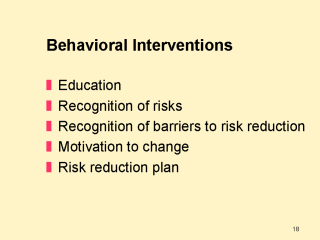 |
Several
well-designed randomized and controlled trials have been conducted to assess the
effectiveness of different behavioral intervention strategies and most conclude that such
interventions result in decreased sexual risk taking and, in some studies, STI and HIV
incidence. Behavioral interventions to prevent HIV infection include basic education about
HIV — what is HIV and AIDS; the natural history of HIV infection, including a prolonged
asymptomatic phase; how HIV is transmitted; and how transmission can be prevented.
However, knowledge is not enough to motivate change. Individuals must be helped to
recognize their personal risks and motivated to change. Barriers to risk reduction should
be identified and strategies developed to overcome them. With these variables in mind, an
individualized risk reduction plan is formulated by the individual and the healthcare
provider. |
